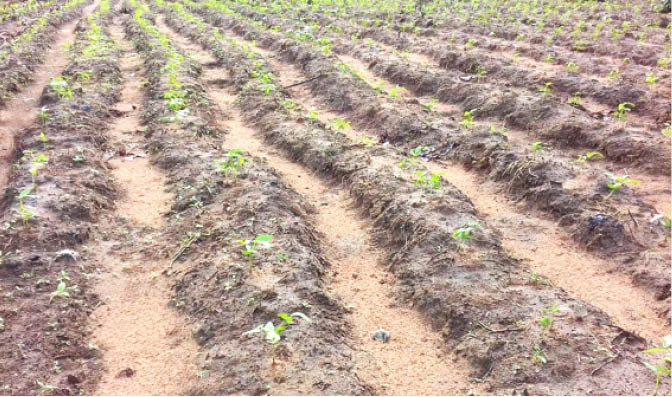Nigeria, biggest importer of Cowpea in Africa
The African Agricultural Technology Foundation (AATF) says Nigeria can save billions of naira if it cuts down on its importation of cowpea. Dr Issoufou Abdourhamane, the Regional Head of AATF in Abuja made this known in an interview with News Agency of Nigeria (NAN) on Tuesday in Abuja. “Nigeria is the biggest importer and producer […]

FILE PHOTO: A cowpea farm at the University of Agriculture in Makurdi
The African Agricultural Technology Foundation (AATF) says Nigeria can save billions of naira if it cuts down on its importation of cowpea.
Dr Issoufou Abdourhamane, the Regional Head of AATF in Abuja made this known in an interview with News Agency of Nigeria (NAN) on Tuesday in Abuja.
“Nigeria is the biggest importer and producer of cowpea in Africa and the world.
“If Nigeria can cut down importation by 20 or 30 per cent, it will be saving the country, hundreds of millions of Naira annually.
“If you look at it, it is billions you are talking about,’’ he said.
The AATF Regional Head in Abuja said the purpose for the creation of the AATF, with presence in other African countries was to intervene and ensure food sufficiency and security.
“With mechanised farming and intervention in crops like cowpea, cassava, and currently rice which is underway, Nigeria can be sure of food security from that perspective.
“AATF is an organisation which focuses on some constraints faced by small holder farmers usually because in Sub-Saharan Africa, we don’t have large producers.
“Most of our producers are the small holder farmers but there are also many challenges to agricultural production,’’ he said.
He said that these existing challenges could be solved step by step and by focusing on them, they could be overcome.
Abdourhamane identified one of these challenges as mechanisation, which would go a long way in boosting food production in the country.
According to him, one of the AATF’s initial projects ongoing in six states in Nigeria is cassava mechanisation, which is a big and important food crop in the country and many other countries.
“One of the key components of cassava production is drudgery, how much labour it takes to plant, weed and harvest cassava because cassava is a shrub.
“We had to show people that solution exist, the cassava mechanisation development going on in collaboration with the National Mechanisation Centre is having very good success and impact,’’ said.
Abdourhamane said that farmers were not only into mechanised farming but were also taught how to weed at the right time, how to control insect pest on cassava and improve the soil fertility.
“As a result of the AATF cassava mechanisation, they were able to multiply the yield from eight to more than 30 tonnes per hectare and this is a real success story.’’
He described cowpea as a big cash crop and cowpea scientists in Africa in the late 80s found out that the limiting factor in the field was `maruca podborer’, insect pest of the commodity.
“So since then, people have been trying to develop resistant variety cowpea, unfortunately cowpea naturally doesn’t have any resistance.
“The development of biotechnology in late 80s and early 90s showed that there is a way because BT Cotton, BT Maize and BT Soybeans have been very popular and successful in the U.S.
“They were able to develop the BT Cowpea after difficult challenges, which will help boost the production of cowpea because we can double the yield of cowpea.
“We can do that easily if maruca is the challenge and in the area of marca challenge, we can easily double the yield.
“By doing this, not only do we improve food production, we’ve improved protein content,’’ he said.
Abdourhamane stressed the nutritional value of nitrogen and protein in the human body, stating that cowpea was easily affordable by those who could not readily purchase meat as a vital source of protein.
“It’s not an academic exercise, we are talking about food security, it is human health, also the economic, financial aspect,’’ he said. (NAN)
